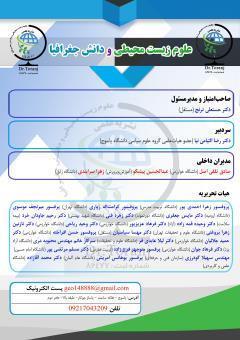مفاهیم و شیوههای معلمان در کار میدانی زمینشناسی
محورهای موضوعی : Earth Sciences
1 - پیام نور سیسخت
کلید واژه: زمين شناسي, کار میدانی, معلمان, مفاهیم, تمرینات,
چکیده مقاله :
یادگیری زمینشناسی که در مدارس متوسطه تدریس میشود در طول زمان دستخوش تغییراتی شده است. بسیاری از محققین به دنبال راهبردهای جدید هستند یا سعی میکنند راهبردهای موجود را اصلاح کنند تا روشهای آموزش این موضوع را بهبود بخشند و به ظهور شهروندان فعال، منتقد و قاطع کمک کنند. کار میدانی یک استراتژی بهطور فزایندهای برای یادگیری یکپارچه در حوزه علوم زمین است. در این تحقیق به دنبال شناسایی نوع و فراوانی کار میدانی اجراشده توسط معلمان زمینشناسی بودیم. همچنین هدف ما درک اهمیت کار میدانی در آموزش علوم زمین بود. برای این منظور، نظرسنجی توسط 16 معلم زیستشناسی و زمینشناسی پایه یازدهم تهیه و به آنها پاسخ داده شد. نتایج نشان میدهد که اکثر معلمان تا سه بار در سال به کار میدانی متوسل میشوند. همچنین معلمان میدانند که مناسبترین نوع کار میدانی برای این سطح از تدریس، کار میدانی حل مسئله است. بااینحال، اکثر فعالیتهای انجامشده توسط معلمان نشان میدهد که آنها معمولاً از نوع کار میدانی مشاهده مستقیم استفاده میکنند. این نتایج نشان میدهد که معلمان نیاز به آموزش در سطح اجرای کار میدانی حل مسئلهدارند.
Geology learning taught in secondary schools has undergone changes over time. Many researchers are looking for new strategies or trying to modify existing strategies to improve the teaching methods of this subject and help the emergence of active, critical and decisive citizens. Fieldwork is an increasingly popular strategy for integrated learning in the geosciences. In this research, we sought to identify the type and frequency of fieldwork performed by geology teachers. Also, our goal was to understand the importance of fieldwork in earth science education. For this purpose, a survey was prepared and answered by 16 11th grade biology and geology teachers. The results show that most teachers resort to fieldwork up to three times a year. Also, teachers know that the most suitable type of fieldwork for this level of teaching is problem-solving fieldwork. However, most of the activities carried out by the teachers show that they usually use the direct observation type of field work. These results show that teachers need training at the level of implementing problem-solving field work.
• Brusi, D. (1992). El treball al camp en ciències naturals [Fieldwork in natural sciences]. In Geli de Ciurana, A.M. e Terradellas i Piferrer, M.R. (Eds.), Reflexions sobre l’ensenyament de les ciències naturals [Reflexions about natural sciences teaching] (pp. 157-194). Barcelona: Eumo Ed.
• Compiani, M. (1991). A relevância do trabalho de campo no ensino de Geologia na formação de professores de Ciências [The relevance of fieldwork in the teaching of Geology in the training of science teachers]. Cadernos do IG/UNICAMP, 1, 2-25.
• Del Cármen, L. &Pedrinaci, E. (1997). El uso del entorno y el trabajo de campo [The use of the environment and the fieldwork] . In L. Cármen (Coord.), La enseñanza y el aprendizaje de las ciencias de la natureza en la educación secundaria [Teaching and learning natural sciences in secondary teaching] (pp.133-154).
• Barcelona: Universitat Barcelona e Editorial Horsori. Dourado, L. (2001). O trabalho prático no ensino das Ciências Naturais: situação actual e implementação de propostas inovadoras para o trabalho laboratorial e o trabalho de campo [Practical work in the teaching of Natural Sciences: present situation and implementation of innovative proposals for laboratory work and fieldwork]. Unpublished PhD thesis. Braga: Universidade do Minho, Portugal.
• Ghiglione, R. & Matalon, B. (1995). O inquérito – teoria e prática [Inquiry – theory and practice]. Oeiras: Celta Editora.
• Nieda, J.R. (1994). Algunas minucias sobre los trabajos prácticos en la Enseñanza Secundaria [Some minutiae of practical work in Secondary Teaching]. Alambique. Didáctica de las Ciências, 2, 15-20.
• Pedrinaci E., Sequeiros L., Garcia de la Torre E. (1994). El trabajo de campo y el aprendizage de la Geologia [Fieldwork and learning Geology]. Alambique. Didáctica de las Ciencias, 2, 37-45.
• Quivy, R. & Campenhoudt, L. V. (1998). Manual de investigação em Ciências Sociais [Research book about social sciences] . Lisboa: Gradiva.
• Rebelo, D. & Marques, L. (2000). O trabalho de campo em geociências na formação de professores: situação exemplificativa para o Cabo Mondego [Fieldwork in Geology teacher training]. Aveiro: Universidade de Aveiro.


